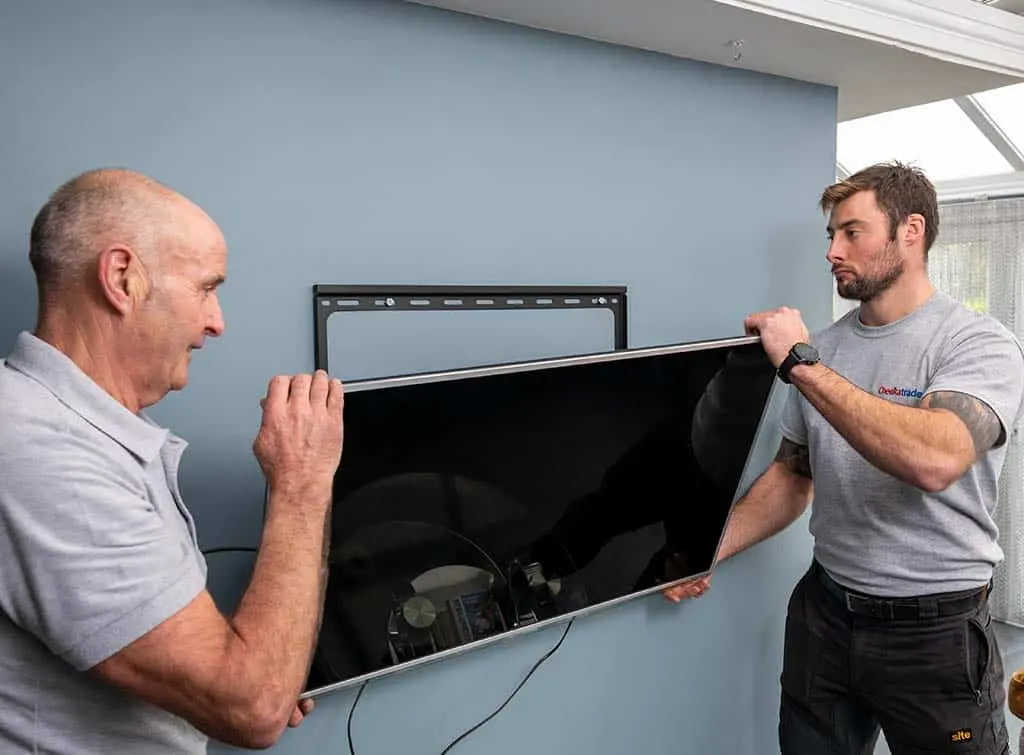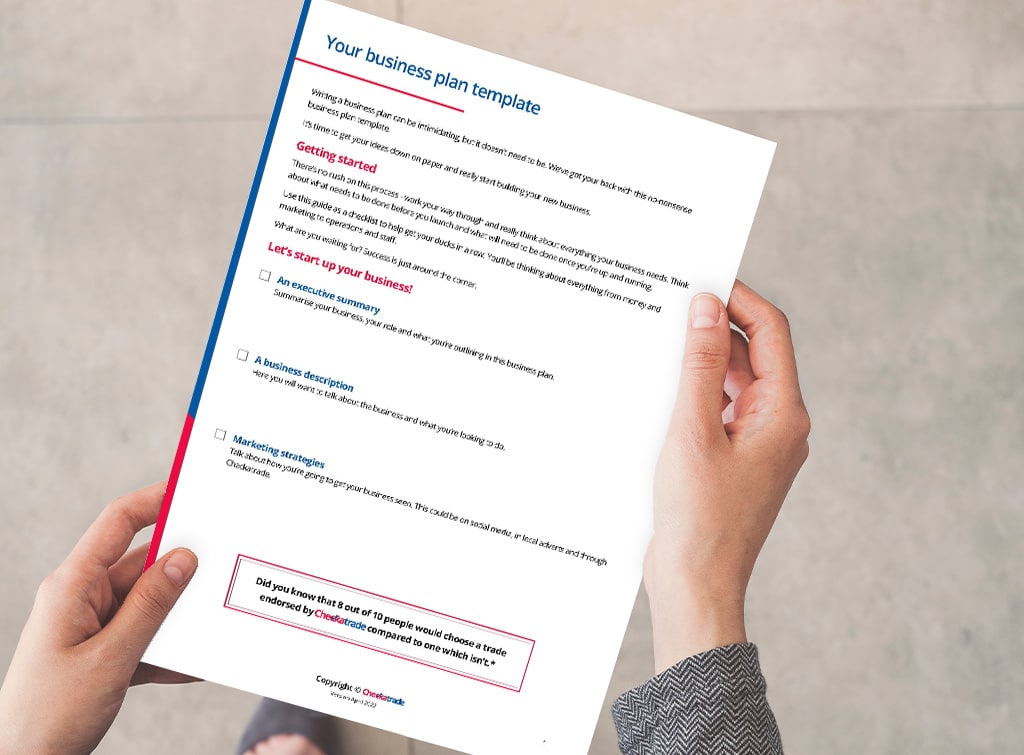Blog>Trade>Starting a Business>How to start a telecommunications business
Last updated: 6 January 2025
How to start a telecommunications business
Helping people get connected with the wider world is an important part of every day life. We live in an increasingly digital age, so knowing how to start a telecommunications business is useful if you have the necessary trade skills.

What is telecommunications services?
Working in telecommunications gives you a fantastic insight into modern homes. You'll get to work with the latest technological innovations, making this a fast moving, never boring industry. If you have the skills, and want to branch out on your own, you'll likely want to know how to start a telecommunications business.
With more and more people needing the internet for everyday home life, there are a range of services you may need to provide:
Connecting phone lines
Setting up routers
Getting devices connected (such as TVs)
Setting up smart home automation
Helping boost mobile signal
Services like these are an integral part of every modern home, but are often overlooked as vital trade skills. You may work with data providers, cellular networks, on building home security systems or in many other fascinating areas.
If you've upskilled into telecoms engineering from being an electrician, you'll have a number of the skills necessary for working in telecommunications.
With a broad level of homeowner interest, you could choose to start your own business and become your own boss.
With the opportunity to make your own business decisions and choose who you work with, this is a big decision with incredible rewards. Whether you’re ready to take your first steps or if you’d like to know more, this guide is here to support and advise you.

Advantages to starting a telecoms business
So, let’s start by looking at the many advantages to starting a business in telecommunications. Well, to begin with, you’ll have complete control over how your business is run. You get to become your own boss and set out your own working pattern.
You'll be able to:
Set your own hours
Choose what services to offer
Shape the aims of the business
Work when you want
Choosing the locations you'll cover
You’ll also have the opportunity to invest in your own training, allowing you to improve your skills and offer different services to your customers. Thankfully, the telecommunications sector is also lucrative, meaning you’ll make a good wage to compensate for your hard work.
Another reason to consider starting a telecommunications business is the knowledge of existing customer interest. For example, just through Checkatrade there were over 15,000 job searches in 2024.*
So what are you waiting for?
Want to get more work in telecommunications?
Find more work as a Checkatrade member
Putting together a telecommunications business plan
As with any new company, it’s always worth sitting down and creating an in-depth business plan.
This’ll be looked at by potential investors, so ensure you cover everything you want to achieve. A telecommunications business plan will help you set goals to know what you’re aiming for.
Make these goals SMART by ensuring they are:
Specific
Measurable
Achievable
Realistic
Time-based
Knowing how to start your business in telecommunications means getting a plan in place first. It will help you have a benchmark. That way you'll have ways of checking your success, and plans can also help when you're trying to secure funding or open a business bank account.
How to write a business plan
Why use a business plan for a small business? Every business needs to create a business plan. But what is it? A business plan is a written document that outlines: 1. Where you are now 2. Where you want your business to be in the future 3. How you're going to get there. A clear business plan will
Finances
One of the most important parts of a telecommunications business plan is your finances. You’ll need to outline how you’ll fund your business, whether through savings, loans or other investments.
You’ll also have to work out charge customers and consider any outgoings like tools, insurance and materials. Consider using a job pricing template so you can make enough money without overcharging.
Logistics & legal
Next, decide on the logistics of your new company. Where (location), when (working hours) and how (services offered) will you operate?
Remember to also consider the legal aspects of starting a business. You’ll need to register with Companies House, get the relevant insurance and licences, plus pay tax and National Insurance.
Marketing
It’s important to have a plan for marketing your company and finding work. For example, who are your targeted customers, how will you stand out over your competition and how will you reach clients?
You could consider paying for advertising (both on and offline) or invest in lead generation such as when you join Checkatrade. We help with marketing materials and exposure for your member profile.
Risks
Finally, take a little time to think about the risk factors for your business. Don’t forget, without insurance your business may be vulnerable in case of any mistakes or accidents on your part.
Also, ensure you always operate with safe working practices to help protect yourself from injury.

Knowing how to start a telecommunications business
Starting a new business can mean you face a number of challenges, so proper preparation is key.
Once you have a bulletproof business plan, you’re ready to take your first steps. However, it’s really important to take a little time to consider the following points:
You can set your own hours, but you may want to work when customers are available like weekends or evenings
Stick to your financial plans and never overextend yourself financially
Consider getting protection for your business with a range of insurance options
Decide whether or not you’ll take on other employees
Choose whether to offer a wide range of services or specialise in a certain area
Check you have the right qualifications and training for the services you plan to offer
Once you've put together a robust plan and considered all possibilities, you're nearly set for a business in telecommunications.
Want to get more work in telecommunications?
Find more work as a Checkatrade member
What skills do I need to start my own telecoms business?
Starting your own telecoms business is different to being an employee and working for another company. This may mean you need a different skillset to make your business successful.
Naturally you'll need to have completed training in telecommunications themselves. Whether that is through:
Apprenticeship
College course
University course
On-the-job training with another service provider
If you’re lacking in certain areas don’t worry, there’re always additional courses you can take to learn certain essential skills.
For setting up a business, you’ll also need to draw on the following skills:
Problem solving
Communication and the ability to solve conflict if necessary
Flexibility when it comes to adapting to new challenges and ways of working
Physical abilities to do more active jobs
If you're wondering how to start a telecommunications business it is because you already possess the necessary skills - both in the telecommunications industry, and business management skills as well.

Is the telecom business profitable?
With a constant stream of new innovations and inventions, the telecommunications sector is growing fast.
This means there’s high levels of demand for skilled telecoms engineers and that the telecoms business is profitable.
When considering the profitability of a business in telecommunications, you need to consider the following:
People always want to avoid lengthy waits
Your specialism could meet the need of a local population
Larger service providers in telecommunications can be hit-and-miss
You can run your own business alongside regular employment
It’s worth noting that if you plan to offer unique services you can increase the amount you charge your customers. Plus, investing in training means you can offer a better-quality service with higher rates.
Want to get more work in telecommunications?
Find more work as a Checkatrade member
Can an engineer start their own business?
Absolutely, any telecoms engineer can start his/her own business. In fact, having experience as an engineer will mean you’re familiar with the sector, giving your company a great head start. As an engineer, you’ll also have the necessary training to branch out on your own.
While many telecommunications businesses end up with multiple employees and a wide range of services, there’s no reason you can’t start small and offer specific services to a niche market.
If you think about the potential waiting times that homeowners can face, providing an emergency telecom service could prove very lucrative indeed.
Wondering where to start as an engineer? Just use the following tips:
When you start your new company, focus on jobs you can work alone, reducing running costs and keeping things simple
Keep on top of your finances by setting a budget and sticking to it
Only buy essential tools, or hire specific ones for jobs that can be included in the overall job price
Use free or cheap marketing channels to reach new customers
Work only in your local area to save on petrol costs
With a new telecommunications business, you could also consider joining Checkatrade to help increase the visibility of your new venture. With an optimised profile and our support, we'll help you find more customers. Plus, there are a range of different membership options to best suit your needs as a business.

What are some of the tools you will need?
As a telecommunications engineer, you’ll need a range of tools to do your job.
Working for another company may have meant using their equipment so it could be necessary to buy your own tools when starting your telecoms business.
Some of the essentials to consider having in your toolkit are:
Screwdrivers
Cable cutters
Wrenches
Wire strippers
Crimping pliers
Scissors
Wire pulling tools
Voltage and circuit test equipment
Laser measuring tools
Don’t forget that becoming a Checkatrade member will give you access to exclusive offers and discounts where you can save on business essentials like tools, materials and insurance.
Everything you need to know about tools insurance
Not having the tools you need for a job is more than just frustrating. It can quickly put a dent in your profits if you have to delay or cancel work. Why tradespeople should consider tools insurance Stolen, lost or damaged tools can be an unfortunate fact of life for tradespeople. It can happen
Consider running parallel businesses
Whether you're a telecommunications specialist, or are thinking of offering those services, you could think about running smaller businesses alongside each other.
As one of many electrician side hustles, the telecommunications sector continues to grow.
If you’d prefer to move to a new sector that is closely linked with telecoms engineering, starting an electrical engineering business is also a great option. This is a brilliant solution if you’re losing motivation in your current job role and will mean taking on a range of new challenges.
Interested? Check out our how to start an electrical engineering business guide to learn more.
Checkatrade members get more for their money
Our members save ££££s every year on business essentials

Useful checklist for starting a telecommunications business
A business in telecommunications can be profitable
There is existing customer interest
A detailed and accurate business plan will help shape your new business
Make sure you have the right tools
You have the option of starting small and growing organically
Set a range of goals so your business has a clear progression plan
There are a range of telecommunications business ideas - especially for marketing
Joining Checkatrade is a fantastic way to grow your business and save you money
Once you've considered all the steps and information that you need, you'll know how to start a telecommunications business and can get going with the next step of your career.
Checkatrade members get more for their money
Our members save ££££s every year on business essentials
* Internal search data from users of the checkatrade.com website in 2024




